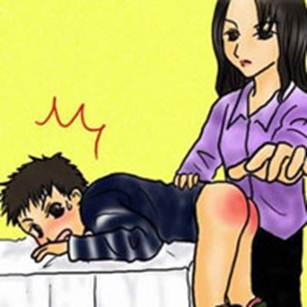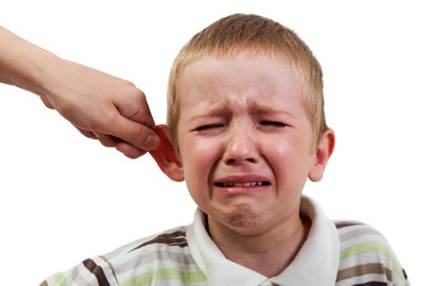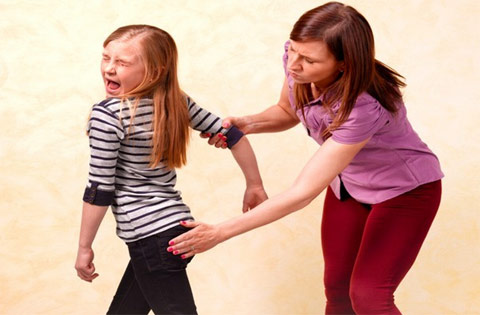It’s difficult to punish your children in
right way. Do not lose your temper when they make mistakes.

Punish
children in right way
When children make mistakes, parents
usually teach, recommend, and even apply punishment. However, to punish your kids reasonable and
effectively, you need to understand requirements and characteristics of their
psychology.
Chronological psychological development
Besides hoping to be satisfied on
biological side such as eating, wearing, and living, children also have
necessarily psychological requirements for normal development like being safe,
loved, respected, sympathized, and valuable.
Under
1-year-old babies
Babies are really close to their mothers or
people who directly care for them in order to have the feeling of safety
through love, care, talking or playing together. If punished (scold or cane),
they will lose that feeling, and be scare, which affects early the development
of their language and social interaction.

To
punish your kids effectively, you need to understand requirements and
characteristics of their psychology.
1-to-3-year-old
babies
Children begin doing many things on their
own to prove themselves while their thought is detail, and their body still
acts clumsily causing damage or break. If punished on body or scolded, they
usually have reaction of resistance, stubbornness, screaming, or tantrum.
3-to-6-year-old
babies
Children have developed their language,
spoken full sentences, recognized their gender, increased gradually ability of
adjusting themselves, and loved to discover the world outside. They also have
assertive manner, so they are usually stubborn, easy to be considered as
naughty kids, and begin learning what is right and reasonable in social side.
Because babies in this age are very sensitive, if punished their mistakes, they
will become less confident, and not be interested in learning.
Harm of punishment with wrong method
Parents always apply punishing method for their children because
they have wrong conceptions: adults are always right, children must follow
their commands; punish children is also possible to
make them docile and obedient; keep strict to have respect from children; they
are easy to be disobedient if not punished; there are no effective ways to
punish except spanking, and so on. So, when kids make mistakes, many parents
apply methods of physical and mental punishment. Physical punishment is actions
making pain or injuries on baby’s body such as spanking, pinching, kicking,
slapping, confining, hanging, kneeing. Mental punishment is actions damaging
sentiment as abusing, laughing, dishonoring, threatening, abandoning, and so
on.
These above punishments can lead to bad
consequences on psychology such as: kids do not understand why their parents
say to love them but punish them; children will be worried, scared,
unconfident, and angry, and find ways to revenge or lie so as not to be
punished; they also misunderstand that violence can deal with any problems. If
punished frequently from young, they will establish unstable behaviors in the
future, and can continue educating their children according to these methods.

Parents
always apply punishing method for their children because they have wrong
conceptions.
How to punish kids effectively?
To punish children effectively, parents
need to know the reason of wrong behavior of children. You must be patient,
listen and find out clearly why they do that. Negative behavior of kids can be due
to different purposes such as attracting attention of others, showing up their
power, giving up, retaliating,… Patience, softness, and emotional control of
parents when teaching children will lead to more effective and longer results
than using punishment.
To teach kids effectively and in order for
them to correct their mistakes, parents should apply the method of positive
discipline. This method does not use force, not spank but still has effect by
applying natural consequence and logical consequence. Natural consequence is what
happens naturally without management of adults. For example, not eating makes
you hungry; forgetting wearing coat causes coldness, and so on.
Two rules applied for natural consequence
are: do not damage children, and do not influence others. Logical consequence
requires interference of adults; for example, if kids do not study, they will
have bad grade; if kids break toys, parents will not buy any more. Three rules
for logical consequence are: cause and effect have to be related to each other
(for example, if not putting toys in order, children will not be allowed to
play them next time), respect kids, and reasonable. Methods of discipline
belonging to logical consequence are carried out by following ways:
Lightly
object
Tell children lightly and give forms of
punishment if they make mistakes. For example, you can say: “Do not turn TV’s
sound up like that because it’s too noisy”. If they do not implement, you
continue: “If you continue maintaining it, I will turn TV off in 15 minutes”.
If your children do not turn TV down, you will switch it off in 15 minutes as
saying. If they obey, you should express your satisfaction.
Stamp
out or ignore
If their wrong behavior is in light level
and does not cause serious results, you should apply this method.
Isolate
temporarily
Leave them in place where there is no
interesting thing in short time (the number of minutes is equal to children’s
age and is not over 15 minutes). Before punishing them, you have to give them the
reason why.
Strip
rights
Not allow babies to play toys or do actions
which they are preferred if they do not implement requirements.
Create
chance for correcting
You need to explain consequence of wrong
behavior in order to help your children know how to improve. After that, not
praise because they will receive much attention and can relapse imperfection
again.
Educating children is a process. Desiring
them to become good people requires parents to have skills, unite the way to
teach their babies basing on love and close cooperation with school. Helping
children recognize their defects and making chance for them to correct
imperfection as well as develop strong points are best ways to assist your
children to develop harmoniously and adapt well in the community in the future.